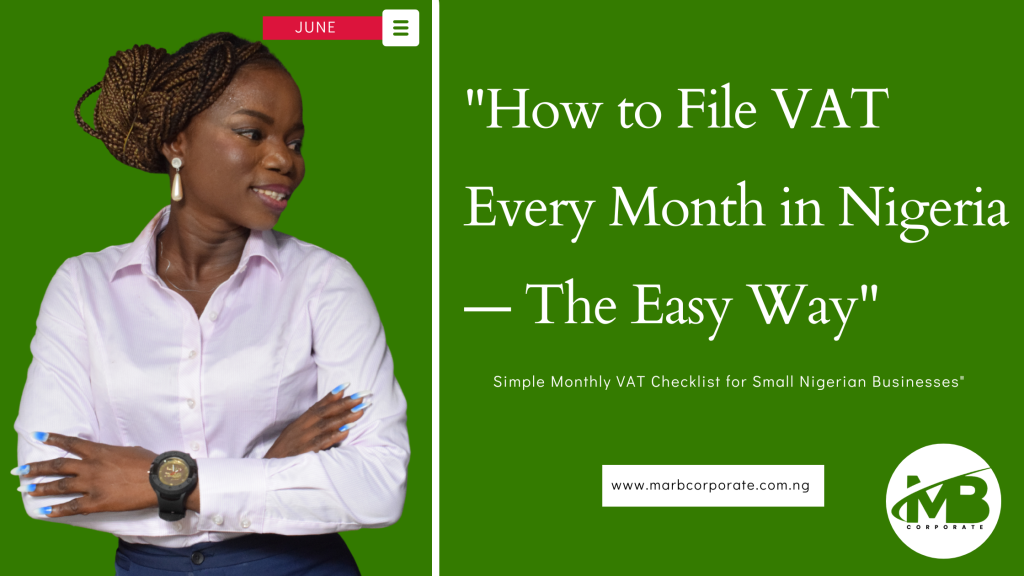
If you run a registered business in Nigeria, you’ve probably heard about VAT—that 7.5% tax you’re supposed to charge customers on certain products or services.
But here’s the part many small business owners miss: VAT isn’t a one-time thing.
You’re expected to file it every single month, whether you made sales or not.
Yes—even if your shop was closed, your Instagram was quiet, or clients didn’t pay up… you still need to file.
And ignoring this responsibility? It can cost your business more than you think.
So, in this guide, we’re breaking down exactly what you need to do every month—in plain language, no tax jargon.
What’s VAT, and Why Should You Care?
VAT (Value Added Tax) is a 7.5% tax the government expects you to collect on eligible goods and services. When your customers pay you, you’re supposed to set aside that VAT and send it to the Federal Inland Revenue Service (FIRS).
Here’s what you must do if your business is VAT-registered:
✅ Add VAT (7.5%) to your prices
✅ Collect that VAT from customers
✅ File and pay it to FIRS by the 21st of the next month
Even if you didn’t make a single sale, you still have to file a NIL return.
What Happens If You Don’t File?
If you don’t file your VAT return every month, FIRS will treat it like you’re ignoring your duties—even if business was slow.
And the penalties are not light:
₦50,000 fine for the first month you miss
₦25,000 for every month after that
Interest on any unpaid VAT
Trouble with banks, grants, and even clients who check your tax compliance
It’s cheaper to file—even when you don’t sell—than to ignore it.
The Easy Monthly VAT Filing Checklist
Let’s break it down like you’re handling your own books this month. Here’s what to do:
✅ 1. Write Down All Your Sales That Had VAT
Every product or service you sold with VAT must be recorded.
This includes:
Cash sales
POS and transfer sales
Corporate clients
Retainers or invoices
💡 Tip: Always use invoices or receipts that clearly show VAT separately.
✅ 2. Gather Your VAT-Related Expenses (Optional, but helpful)
Did you buy goods or services for your business that had VAT?
If yes, that VAT can help reduce what you owe.
Just make sure:
The invoice/receipt shows the VAT amount
It includes the seller’s TIN (Tax Identification Number)
✅ 3. Log in to the FIRS TaxPro-Max Portal
You’ll need your TIN and password. Go to https://taxpromax.firs.gov.ng
Steps:
Click on VAT section
Fill in the form with your numbers
Upload supporting documents (like invoices)
Submit and download your receipt
Deadline: The 21st of the next month
✅ 4. Get a Payment Reference Number (PRN)
Once you submit your return, the system gives you a PRN—you’ll need this to make your payment.
Use the PRN at:
Any bank (go with your PRN printout)
FIRS-approved online payment channels
✅ 5. Pay What You Owe
Pay the exact VAT amount based on your calculation and filing.
Keep your proof of payment safe—it’s your protection.
✅ 6. Keep All Records
Save everything:
VAT return receipt from FIRS
Payment confirmation
Invoices and expenses for the month
Why? In case of a tax audit or when applying for loans, grants, or compliance certificates, these documents will speak for you.
✅ 7. Repeat Every Month (Yes, Every Month)
You can’t “file once and rest.” VAT is monthly. No excuses—even if:
You made no sales (file NIL)
You’re a small business (if VAT-registered, you must file)
You’ve already paid other taxes (this is separate)
What Documents Should I Have Ready?
| Document | Why You Need It |
|---|---|
| Sales invoices with VAT | Show how much VAT you collected |
| Purchase receipts with VAT | Help reduce your VAT liability |
| PRN from FIRS | Needed to make payment |
| Payment receipt | Proof you paid what you owed |
| Summary report | Helps you or your consultant file easily |
Need Help with VAT Filing?
VAT filing can be frustrating—especially if you’re running your business alone or not good with numbers.
That’s why MARB Corporate exists—to take this off your plate completely.
We help:
File your monthly VAT correctly
Track your VAT payments
Avoid FIRS penalties
Set a Monthly Reminder (Don’t Wait for FIRS!)
The deadline is always the 21st of the following month.
Don’t leave it until the last minute.
✅ Set calendar alerts
✅ Ask your accountant to remind you
✅ Or let us help you do it monthly—hassle-free
What If I Didn’t Sell This Month?
No sales? No problem—but you still need to file a NIL return.
That NIL filing tells FIRS you’re still in business, just didn’t make sales this month.
Skipping it = a ₦50,000 penalty—even if your account was dry.
Conclusion
VAT filing is not just paperwork—it’s a legal and financial lifeline for your business. Being consistent with your filing helps you:
Avoid unnecessary stress
Access tax clearance for contracts
Build trust with clients, banks, and partners
It’s easier than you think.
And if you want someone to handle it for you—MARB Corporate is ready to help.
Contact us:
Telephone: +234 80 832 401 93
Email: marbconcepts@gmail.com
